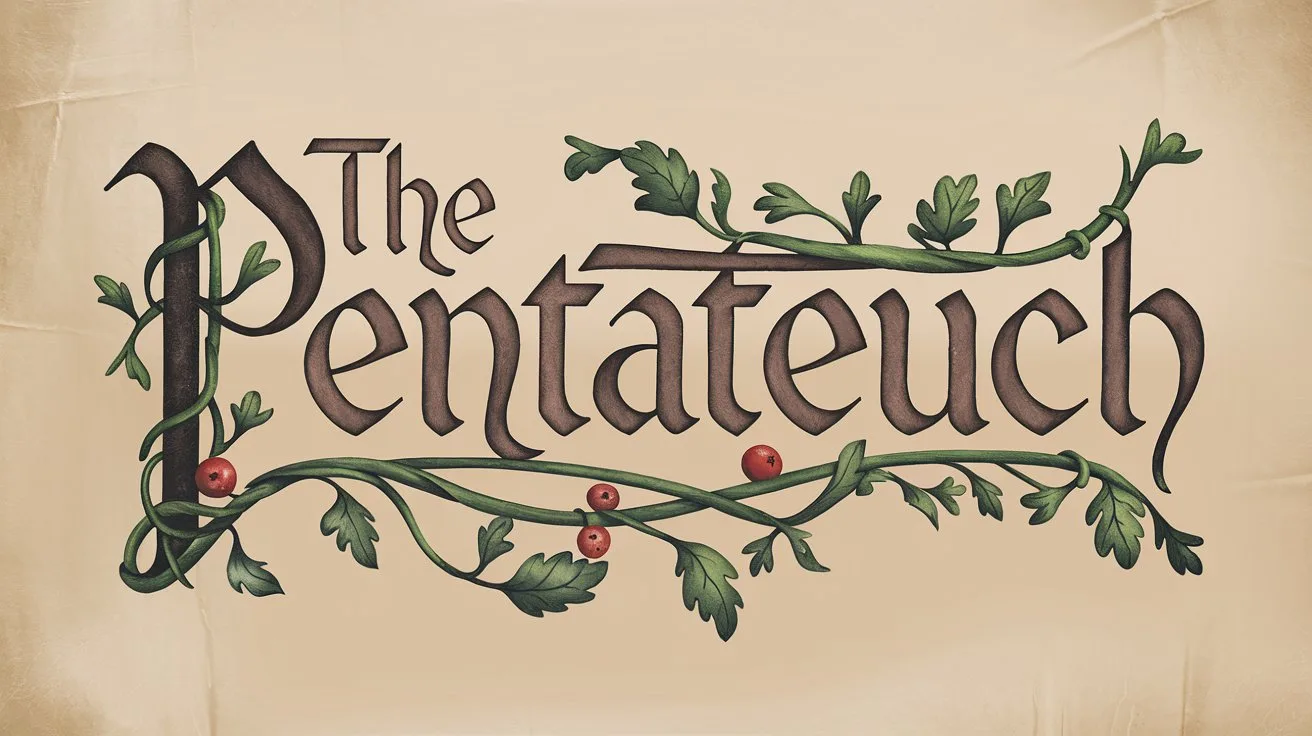The Pentateuch, from the Greek pente (five) and teuchos (scroll or book), refers to the first five books of the Bible: Genesis, Exodus, Leviticus, Numbers, and Deuteronomy. In Hebrew, this portion is called the Torah, meaning “law” or “instruction.” These books were written by Moses under divine inspiration and form the theological, moral, and narrative foundation for the rest of Scripture.
Jesus referred to this section as “the Law of Moses” (Luke 24:44), and it is repeatedly called “the Book of the Law” in both the Old and New Testaments.
The Content of the Pentateuch
Genesis : The book of beginnings: creation, the fall, the flood, the Tower of Babel, and the patriarchs (Abraham, Isaac, Jacob, and Joseph). It ends with Israel in Egypt.
Exodus: The events of Israel’s deliverance from Egypt, the giving of the Law at Sinai, and the construction of the Tabernacle.
Leviticus : A detailed manual for the Levitical priesthood, covering offerings, cleanliness, holiness, and the priestly system.
Numbers : The wilderness wanderings, the organization of Israel, the rebellion of the people, and the preparation to enter the Promised Land.
Deuteronomy : Moses’ final sermons and instructions before his death, including a restatement of the Law and covenant renewal.
Together, these books cover creation to the edge of the Promised Land—over 2,500 years of history and the full scope of God’s covenantal dealings with man up to the conquest.
When Was the Pentateuch Written?
The Pentateuch was written by Moses, the man of God (Deuteronomy 31:9), during the wilderness journey, likely between 1446–1406 B.C., following the Exodus. He received direct revelation from God at Sinai and recorded the history, laws, and commands given to Israel. God instructed Moses to write these things down:
“Then the LORD said to Moses, ‘Write this for a memorial in the book’” (Exodus 17:14).
And again:
“So Moses wrote this law and delivered it to the priests… that they should read it every seven years” (Deuteronomy 31:9–10).
Moses wrote, and the Levites preserved it:
“Take this Book of the Law, and put it beside the ark of the covenant of the LORD your God, that it may be there as a witness against you” (Deuteronomy 31:26).
Some minor additions, like the account of Moses’ death in Deuteronomy 34, were likely added by Joshua under the Spirit’s direction. But the Law was completed by Moses and treated as sacred Scripture immediately.
Preservation and Canonization
The Pentateuch was preserved by the Levitical priesthood and read publicly to the people. By the time of Ezra and Nehemiah (5th century B.C.), the Law of Moses was the central authoritative document of Israel’s faith and national identity (Nehemiah 8:1–8).
It remained the first and most sacred part of the Old Testament canon. The rest of the Tanakh (Prophets and Writings) would be added and recognized over the centuries, but the Torah was always the foundation.
The Group That Only Used the Pentateuch
In the New Testament, the Sadducees were the sect that only accepted the Pentateuch as authoritative. They rejected the Prophets and Writings (the rest of the Old Testament) and did not believe in resurrection, angels, or spirits (Acts 23:8).
Jesus exposed their error when they challenged Him on the resurrection:
“You are mistaken, not knowing the Scriptures nor the power of God… But concerning the resurrection of the dead, have you not read what was spoken to you by God, saying, ‘I am the God of Abraham…’ God is not the God of the dead, but of the living” (Matthew 22:29–32).
Jesus refuted their doctrine using only the Pentateuch, showing that resurrection hope was present even in the Law.
The Pentateuch and the Gospel
Jesus continually referred to the Pentateuch, affirming its divine authority.
In John 5:46, He declared:
“For if you believed Moses, you would believe Me; for he wrote about Me.”
From the fall in Genesis 3:15, where God promised the seed of the woman would crush the serpent’s head, to the typology of the Passover lamb (Exodus 12), the sacrifices of Leviticus, and the prophetic promise of a future Prophet like Moses (Deuteronomy 18:15), the entire Pentateuch points to Christ.
Paul writes in Galatians 3:24,
“Therefore the law was our tutor to bring us to Christ, that we might be justified by faith.”
The Pentateuch laid the groundwork for understanding sin, holiness, sacrifice, and covenant.
My Final Thoughts
The Pentateuch is not just an ancient book of history; it is the divine foundation upon which God revealed His covenant, His holiness, and His redemptive plan. Written by Moses under the direct command of God, preserved by faithful hands, and confirmed by Christ Himself, it remains the cornerstone of our understanding of Scripture.
It is no wonder that even the enemies of Christ, like the Sadducees, recognized its authority (though they missed the One it was all pointing to). For us, the Pentateuch is not only history; it is the beginning of glorious events that finds its fulfillment in Jesus Christ.





 Get the book that teaches you how to evangelize and disarm doctrines from every single major cult group today.
Get the book that teaches you how to evangelize and disarm doctrines from every single major cult group today.